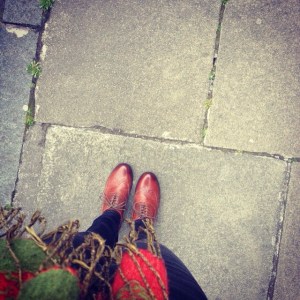I miss walking.
It has, for most of my life, been a source of quiet joy, and, at times, comfort. I have, throughout my life, used walking as a way of thinking through things and tending to my emotional life; as a way of reminding myself of the myriad of small things and encounters in that world that spark my curiosity, and that the world is bigger than my thoughts. Walking, too, has been a gentle act of engaging or re-engaging with my body. Having my feet on the ground, and feeling my way through locomotion has been a way of checking in with myself. Walking, for much of my adult life, has been my main mode of transportation, since I have never owned a car.
I will love walking again, I know.
But for the time being, walking is a source of considerable anxiety and often pain for me.
The bones in my left ankle have healed around the breaks, but my body has also grown scar tissue around that, and at the front of my ankle. The tissues in my foot have seized up and are reluctant to relax. These tissues now hold memories of considerable trauma, and of the fear that came with that. I suffered from agoraphobia for sometime after the accident—terrified of being knocked over once again by someone not paying enough attention—while simultaneously feeling suffocated and trapped in my own apartment. (I was literally trapped for some time, able to leave, but unable to re-enter the building without assistance because of the layout of the front security door.)

The skin on my ankle, foot and lower leg is tender to touch, like a bruise. This is especially so around the surgical scars.
My left leg withered away somewhat when I wasn’t using it and was using crutches instead. It is still smaller than my right.
 To walk is an effort, even for very short distances. I’m told I walk like I have a wedgie, and this makes me laugh, but also makes me want to cry. My foot and ankle get very tired and swell up if I walk very much during a day, and my knee and hip are suffering too, since they are trying to compensate for the lack of mobility in my ankle.
To walk is an effort, even for very short distances. I’m told I walk like I have a wedgie, and this makes me laugh, but also makes me want to cry. My foot and ankle get very tired and swell up if I walk very much during a day, and my knee and hip are suffering too, since they are trying to compensate for the lack of mobility in my ankle.
Stairs are the hardest. They force the ankle into an angle it no longer likes.
I miss walking. I miss being able to stroll. I miss it more than I could have expected when I sat on the road looking at the very wrong angle my ankle sat at immediately after the accident.
I miss walking. I miss the sense of purpose and self-sufficiency it can give me. I miss the feeling of capability in my body. I miss the feeling of strength in my legs. I am questioning the sense of self I had smugly built on the premise of being able-bodied and fit.
I will walk freely and joyfully again. I am determined, and I am doing everything in my power to get to that place. But I also feel guilty about this grief I feel, given my predicament is temporary, and I don’t know what to do with that.
This is a mental wavering I wish I could walk my way through.
Soon enough, I suppose, I will.
There is a tenderness towards myself and my learning again how to walk, too.
It is fascinating to feel the stiffness start to slowly, slowly give way, and to learn about how scar tissue works and what’s happening when the physio is moving my foot around—traction. My left foot and ankle are still redder than—and sometimes purple—my right because my body is keeping up a higher blood supply to aid in healing. Learning this softens the way I look at and think about the oddness of my left foot and ankle, and reminds me that I can feel tenderness towards myself, not only frustration. It reminds me of the immense amount of quiet work my body is doing, trying to repair the damage of the accident and the surgeries that followed.
Walking, then, and all the additional frustration, discomfort and pain it brings with it for me right now, is perhaps an ongoing lesson not only in what it means to be frail, but also what it means to be pouring energy into healing. The walking is, of course, also how my body is processing the recovery from this injury; how I am re-learning its boundaries now that they also encompass scar tissue and titanium.
I am, then, perhaps, still walking my way through this, determinedly, trying to find a way of being comfortable enough with calamity and joy occurring simultaneously.






